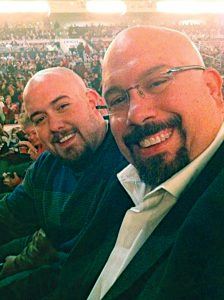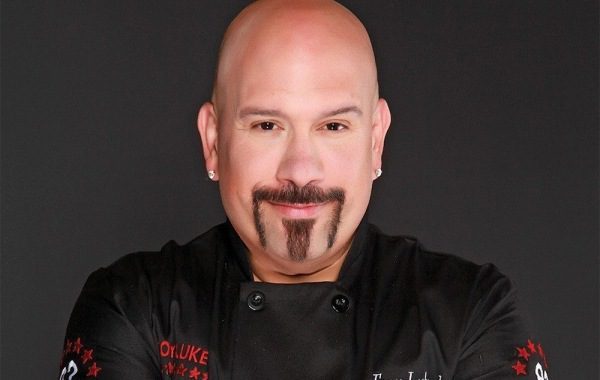
Tony Luke with his son, Tony lll
Tony Luke’s anguish never goes away. Only now he’s angry, and he wants the world to know what he’s learned since his son, Tony III, died from a heroin overdose two years ago. He was 35. The two years since have been filled with turmoil for Luke, whose real name is Anthony Lucidonio, Jr.
Family infighting has changed his role in his cheesesteak empire. He still runs Tony Luke’s Sicklerville location, but his days are mostly consumed with raising awareness about addiction and the stigma that often prevents users from coming clean. Luke has taken on the mission of educating anyone who will listen about what he wishes he had known. It’s his way of honoring the memory of a son who died too young.
Q: Can you talk about losing Tony?
When you lose a child, it’s an ache that never stops. When Tony died, for the first month, I never cried – I wailed. The pain is so bad that you scream at the top of your lungs a spine-curdling scream that starts in your stomach and comes out your mouth. Two weeks later, I went back to work at the Tony Luke’s in Sicklerville – that’s where he worked before he died. A gentleman came in and said he was so sorry about my son. He asked if I minded if he asked how he died. “Was it from cancer?” he asked me. When I said he died of a heroin overdose, he literally said, “See what they do? They destroy your life because of the choices they make.” And all I could think of was that my son heard that bile every day of his life. For the first time, I truly understood what it was like to walk in his shoes for a minute. And then I knew: my mission was to change the way people look at other human beings suffering from this disease.
Q: Why do you think the stigma of addiction is so dangerous?
Heroin took my son’s life, but the stigma associated with that is what killed him. For example, take someone who has been in recovery for six months. Instead of saying “That’s awesome!,” you hear the whispers, “How long until they go back to using?” or “I know they are in recovery, but I’m going to lock up everything in my house because they steal everything they can get their hands on to get high.” When you’re in active addiction, you’re looked at as scum, as a weak individual, and no one will give you a job or take a chance with you because you are going to rob them or become an issue. This is the image people have of someone who is suffering from addiction.
Q: Did that happen with your son?
Yes. He had applied for a job – the first time he wasn’t working with me – and he was scared. He gets a job with another company and they trained him for a couple months. He was proud. He’d come over and shown me emails they sent him about his exemplary performance and how quickly he was advancing. They wanted to give him a new store to manage. He goes to work the first day at his store and calls me up hysterically crying. He got fired as soon as he walked in the door. They told him he didn’t fit.
Trying to figure out why, I googled his real name – it’s not Tony Luke (it’s Anthony Lucidonio III) – and the first thing that came up was his mug shot saying he robbed a TV from Walmart because of a drug problem he had. They must have just found that out. It didn’t matter that he was exceptional at work. He said, “It doesn’t matter what I do, I’ll always be the junkie.”
Q: You battled your own addiction. Did you talk to your son about it?
I had a drug problem when I was a kid. I used crystal meth. It was destroying my life. It got really, really bad one night, and I was taken to the hospital. I never used again. So, when I’m looking at my son, I’m thinking, “I got high every day, but when it was ruining my life I stopped doing it. Why can’t he stop using?”
Unfortunately, I did talk to him. I say unfortunately because here’s someone with a drug problem trying to explain why someone with addiction should stop. A drug problem is not the same thing as addiction. He would go to a dark place a lot and my relationship with him was rocky because of the drug use. I was angry with him a lot. I just assumed it was a choice. I didn’t understand that depression and the mental part of it played a giant role.
Q: You’re certain that his death was accidental. Why?
I wouldn’t use the word accident. When you stick a needle in your arm, it’s not an accident. What I believe is, he was in a tremendous amount of pain from a car accident he had been in, plus he was depressed. He bought a couple bags of heroin and figured he would do this and it would hold him until he got meds for his back – I had just put him back on insurance. But because he was clean for 18 months before that, those two bags were way too much. That might not have been too much while he was actively using, but now he had been clean for more than a year.
Q: What are you doing to promote addiction awareness?
I’ve spoken in Washington and in front of a lot of ambassadors of different countries. I speak in schools that will allow me. Certain high schools don’t want me anywhere around them because, God forbid, they’d have to admit the kids might have drug problems in their district. I wish there was someone I knew who could have told me all this. I don’t know if it would have saved my son, but I could have been a better father to him.
Q: You made a music video for “Make You Feel My Love.” How did that come about?
I wanted to do something to humanize addiction, to make people see these are not numbers and these are not bad people who are dying. No one is a lost cause. If your loved one falls down, you pick them back up and get them the help they need. Bob Dylan’s “Make You Feel My Love” is basically him saying there’s nothing in this world I won’t do for you. I will never give up on you.
When you lose a child, you enter this giant, dark empty space, so I thought of a warehouse. And in the middle of that warehouse is a piano. The father walks in and puts a picture of his child on the piano, cause it’s his heart, the dark place in his soul, and he sings to his child to tell him the things he couldn’t say when he was alive.














